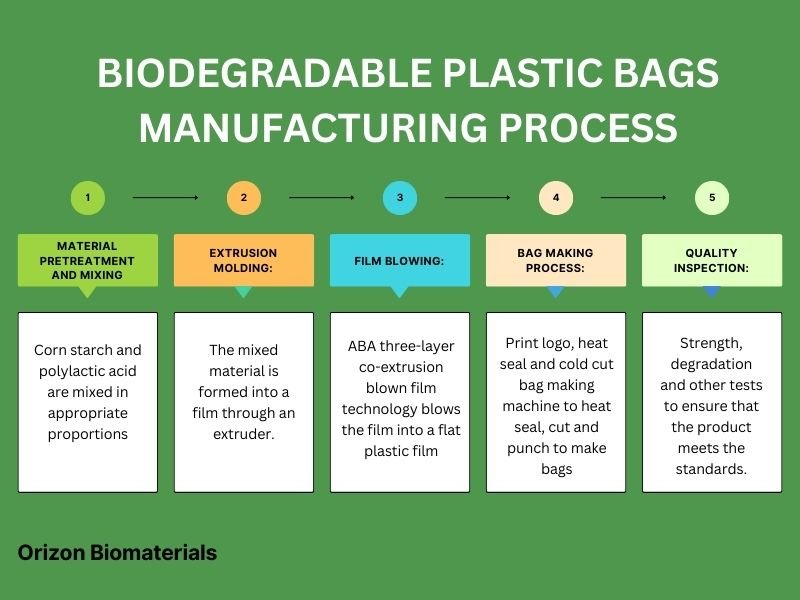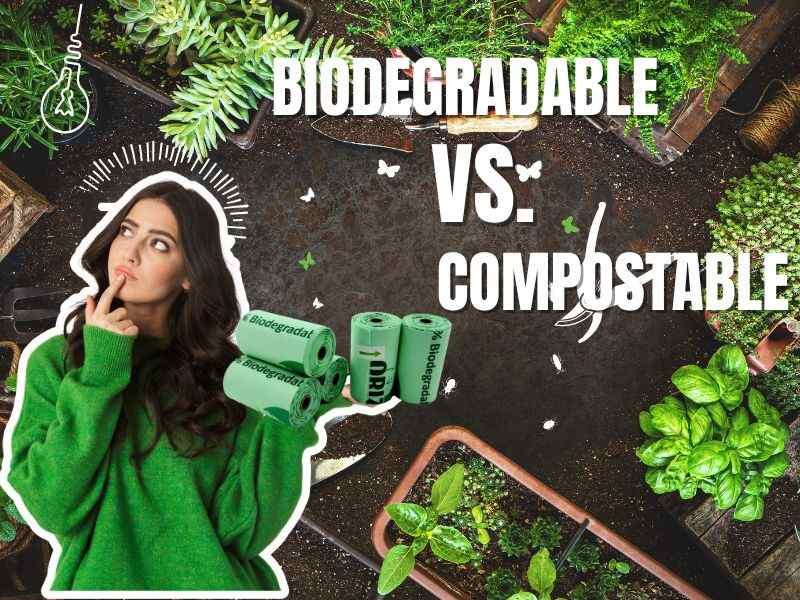Have you heard of compostable bags? With growing awareness of environmental protection, we see compostable or biodegradable labels everywhere. What is a compostable bag? What are compostable bags made of? Are they environmentally friendly? Have you ever wondered?
Today, let’s discuss what compostable bags are made of, why they are more environmentally friendly, how to identify them, and how to dispose of them after use.
What Are Compostable Bags
Compostable bags look similar to traditional petroleum-based plastic bags, but they have a special requirement: they must be composted in industrial composting facilities. Compostable bags require a combination of thickness, strength, and puncture resistance.
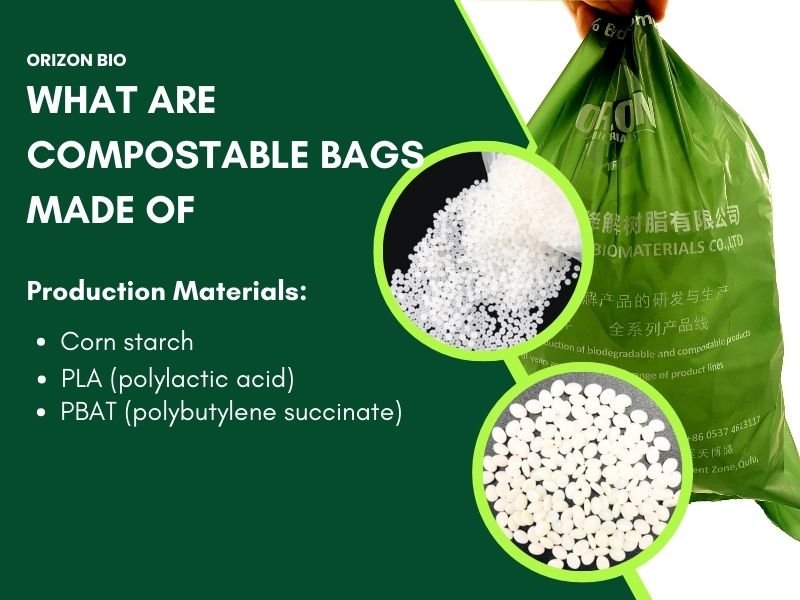
What Are Compostable Bags Made of
Compostable bags are typically made of biodegradable materials. Made from 30% corn and other certified compostable materials.
How it works
- PLA (polylactic acid): A bioplastic derived from corn or other plant starches. It has a relatively hard texture and high strength.
- PBAT (polybutylene succinate): A relatively soft and flexible biodegradable plastic, often blended with PLA to make the bag both tough and resistant to breakage.Microbial degradation of these materials into carbon dioxide and water makes them completely biodegradable.
Corn starch, potato starch, cane sugar, and other natural plant materials are occasionally mixed with wood pulp or cellulose for structural reinforcement.
Most of these materials are bio-based and renewable, making their production process relatively environmentally friendly.

What Is Compostable Trash
Compostable waste refers to household waste suitable for microbial fermentation and conversion into fertilizer. Compostable waste generally includes the following:
- Kitchen waste: Perishable food waste such as leftovers, fruit and vegetable peels and cores, fish bones and meat, eggshells, tea leaves, and coffee grounds.
- Plant waste: Tree branches, fallen leaves, flowers and grass, lawn clippings, and garden waste.
- Food-soiled paper: Such as napkins, paper towels, paper plates, pizza boxes (without plastic wrap), paper cups, tea bags, and coffee filters. These items can be degraded in the compost pile.
- Some compostable plastic products: For example, certified compostable plastic bags or packaging (must meet relevant industrial composting standards).
Note:
- These items must be processed under industrial composting conditions (high temperature, ventilation, and humidity). Standard household composting may not allow for complete decomposition.
- It is not advisable to mix non-compostable waste such as plastic bags, foam, diapers, sanitary products, and medical waste.
Are There Any Additives in the Compostable Bags?
In addition to the main ingredients, compostable bags often contain additives such as antioxidants, plasticizers, and other additives to make the bags more durable and easier to process.
Are these additives completely safe and will not affect the composting process? This is a question worth considering. Currently, there is little information on this topic online, and the impact of these additives on the environment and composting still requires further scientific verification.
Do Compostable Bags Produce Microplastics After Use?
Most people might assume that no microplastics are left behind. The truth is, most composting equipment can degrade them. However, if environmental conditions (such as temperature, humidity, and oxygen levels) are not met, or if they end up in landfills or the ocean, residual microplastics may remain, posing an environmental risk.
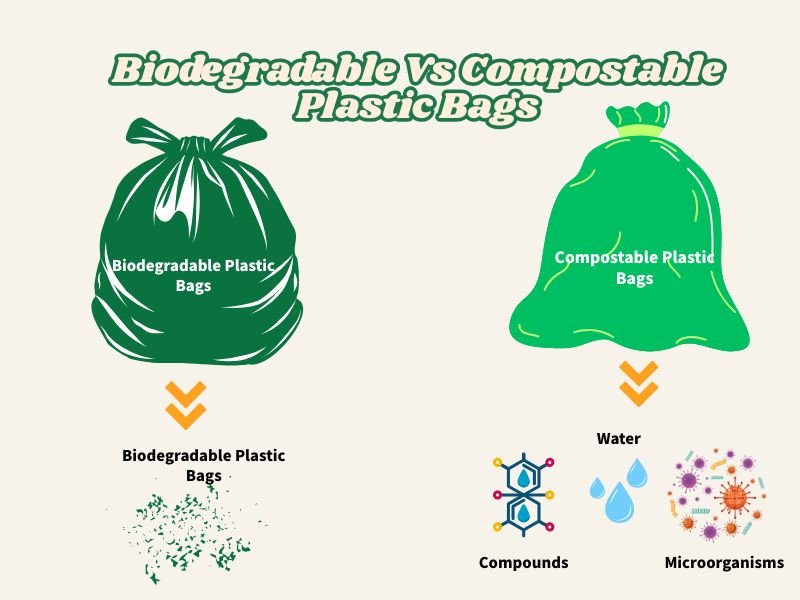
Compostable Vs. Biodegradable Trash Bags
| Feature | Biodegradable Trash Bags | Compostable Trash Bags |
|---|---|---|
| Material Composition | Plastic-based, contains additives to aid decomposition | Plant-based bioplastics, non-toxic and harmless |
| Decomposition Environment | Can slowly decompose in natural or specific conditions | Completely decomposes only in industrial composting systems |
| Decomposition Products | May produce microplastics and other residues | Breaks down into water, carbon dioxide, and organic fertilizer |
| Decomposition Time | Faster than traditional plastics, but uncertain | Certified with strict time limits (usually 10-45 days) |
| Environmental Impact | Possible residual pollution risk to the environment | Environmentally friendly, helps improve soil fertility |
| Suitable Use Scenarios | General waste disposal | Specialized compost waste collection and organic waste processing |
Biodegradabl bags: They are still essentially plastic. While they decompose more quickly, they aren’t necessarily completely harmless and may leave behind microplastic contamination.
Compostable bags: They are truly eco-friendly and suitable for industrial composting systems, where they are fully converted into environmentally friendly materials.
If you want to minimize environmental pollution and promote sustainable development, choose certified compostable trash bags.
For more information on biodegradable vs compostable, see this article:2025 What Is the Difference Between Biodegradable and Compostable
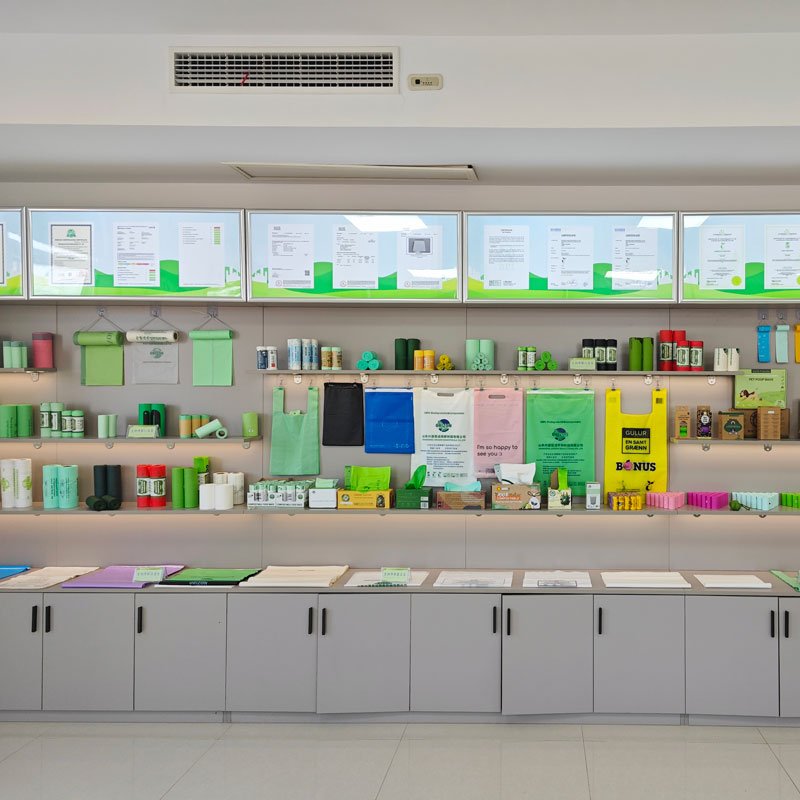
How to Choose Truly Compostable Bags?
The market is crowded, and many people buy counterfeit or substandard products. Practical tips:
1.Look for certification marks on the packaging, such as BPI, ASTM D6400 (US standard), and EN 13432 (European standard). Certification by these organizations indicates the bag has undergone rigorous testing. These official organizations can verify the certification of a product or company. ORIZON bags are all biodegradable and compostable, and have received multiple certifications: You can find our company identification number: 10529118 on the BPI website.
2.Observe the bag’s appearance and label. Authentic compostable bags will usually clearly indicate the material composition and composting information.
3.Try to choose reputable brands and avoid cheap products.
How to Use Compostable Bags
- Avoid mixing: Do not mix regular plastic waste with compostable bags to avoid composting quality.
- Avoid misuse: Ensure compost bags are specifically designed for collecting organic waste and avoid using them for other non-organic waste.
- Pay attention to storage conditions: Avoid prolonged exposure to high temperatures or direct sunlight to prevent premature aging and deterioration.
- Pay extra attention to home composting, turning the pile properly, moisturizing it, and patiently waiting for decomposition to complete.
How to Dispose of Used Compostable Bags
Never throw them in the trash or landfill, as they won’t break down. Ideally, you should:
- Dispose of them at a waste sorting point with industrial composting equipment or a dedicated food waste collection system.
- Participate in community composting programs; some cities already have dedicated compostable waste disposal facilities.
- If you have the resources, you can try home composting. However, be aware that home composting generally doesn’t reach high enough temperatures, so it may take longer.
FAQ
Are Biodegradable Bags Compostable
Only biodegradable bags certified by relevant authorities (such as BPI, ASTM D6400, and EN 13432) are compostable.
Biodegradable bags are capable of breaking down plastic through microbial action, without requiring time or environmental constraints. Decomposition may leave behind microplastic residues.
Compostable bags are completely decomposed by microorganisms into water, carbon dioxide, and biomass in specific industrial composting environments, leaving no harmful residues. These bags are certified by relevant authorities (such as ASTM D6400 and EN 13432).
Do compostable bags really break down completely?
Ideally, under industrial composting conditions (high temperatures of approximately 55-60°C, good ventilation, and moderate humidity), certified compostable bags will completely decompose into harmless materials within the specified timeframe, leaving no plastic residue.
If industrial composting standards are not met, decomposition may be incomplete, leaving residue.
Can compostable bags be processed in a home compost pile?
Compostable bags can be processed in home compost piles, but certain conditions must be met. Home composting is not very accurate in controlling the high temperature environment of 50-65℃ and humidity, and is subject to certain limitations, resulting in slow decomposition
Conclusion
Choosing compostable bags is a way to contribute to environmental protection. However, responsible consumption, proper use, and proper disposal are equally important. Purchasing qualified products and disposing of them according to regulations are the key to truly achieving environmental benefits. I hope this article helps you gain a more comprehensive understanding of compostable bags, making environmental protection simpler and more reliable!
References:
- Wikipedia:[Biodegradable bags][Polylactic acid][PBAT]
- BPI:https://bpiworld.org/

